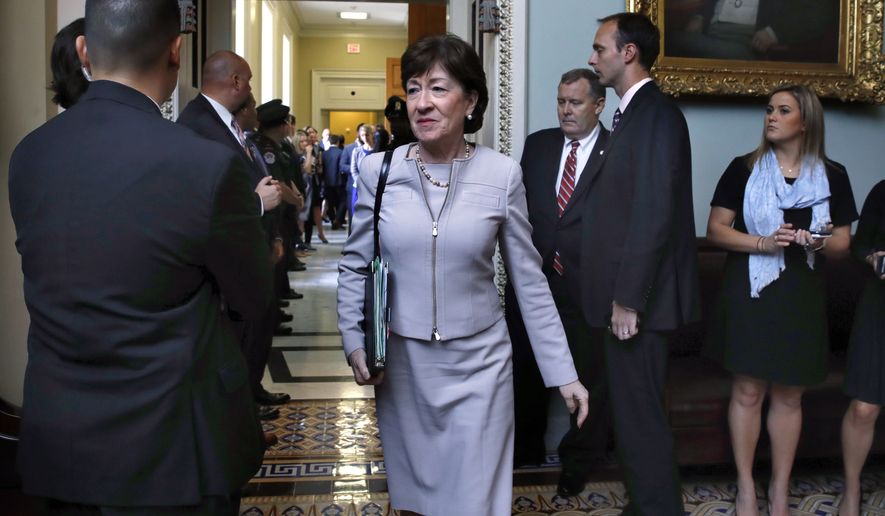Sen. Susan M. Collins said Monday that she will vote against the latest Obamacare repeal effort, dealing what appears to be a fatal blow to Republican leaders’ last-ditch attempt to rewrite the bill and sway holdouts.
Ms. Collins, who also helped sink repeal efforts in July, joined Republican Sens. Rand Paul of Kentucky and John McCain of Arizona as “no” votes. She said she was dismayed by congressional scorekeepers’ analysis that millions fewer people would hold insurance under the Republican plan.
Republicans are racing a Saturday deadline to approve a repeal under fast-track budget rules, and unless they can flip one of the opponents, they will fail to fulfill their pledge to kill President Obama’s signature law.
“Health care is a deeply personal, complex issue that affects every single one of us and one-sixth of the American economy. Sweeping reforms to our health care system and to Medicaid can’t be done well in a compressed time frame, especially when the actual bill is a moving target,” said Ms. Collins, Maine Republican.
President Trump seemed resigned to defeat earlier in the day, telling an Alabama radio program that the Senate bill would come up short.
A Republican hearing on the bill — an attempt to go through some semblance of the regular legislative process — became a rallying point for the anti-Trump resistance, with protesters blocking the proceedings for 20 minutes.
“No cuts to Medicaid! Save our liberty,” the protesters chanted. Some were in wheelchairs as police pulled them from the room.
Republican leaders entered Monday struggling for votes on the third version of their bill. Under the plan, money being used to subsidize Obamacare customers and expand Medicaid in parts of the country would be pooled together and then siphoned back to the states as block grants.
The bill’s sponsors, Sens. Lindsey Graham of South Carolina and Bill Cassidy of Louisiana, were rewriting the legislation Monday to direct more money to states such as Maine in an attempt to win over holdouts like Ms. Collins.
But Ms. Collins said the plan would slash Medicaid insurance for the poor, weaken protections for sicker Americans and could lead to higher premiums or dilute coverage.
She pointed to a preliminary estimate from the Congressional Budget Office that said the plan would save $133 billion yet drive up the number people without coverage.
Mr. Paul, meanwhile, opposes the bill from the other side. He said it keeps too much of Obamacare in place.
“Republicans didn’t promise to block-grant Obamacare. Republicans promised to repeal it,” the Kentucky Republican said.
The House has passed a repeal bill, but Senate Republicans, led by Majority Leader Mitch McConnell of Kentucky, have stumbled. They pulled an initial bill from the floor in June, and a second version was voted down in July.
Some Senate Republicans vowed to press on, brushing aside critiques from consumer groups and lobbies for doctors, hospitals and insurers. Those Republicans say the Affordable Care Act has failed too many people.
“If somebody doesn’t fix Obamacare soon, the majority of counties are going to be down to one provider. It is collapsing as we speak,” Mr. Graham told the Senate Finance Committee, once the hearing on his bill was underway.
Democrats said Republicans should resume what they call bipartisan negotiations on stabilizing the markets rather than settle for a flawed bill to satisfy the Republican base and the party’s donors.
“Nobody’s got to buy a lemon just because it’s the last car on the lot,” said Sen. Ron Wyden, Oregon Democrat.
The rewrite Monday offered extra Medicaid money to states with their own poverty guidelines while boosting block grants for “high-spending low-density states” — provisions that would apply only to Alaska and a few other states.
It added $500 million for states such as Alaska that have obtained Obamacare waivers to implement their own health care programs.
That appeared to be an effort to win over Sen. Lisa Murkowski of Alaska, another holdout.
Other changes appeared aimed at conservatives including Sen. Ted Cruz, Texas Republican, who on Sunday said he wasn’t ready to vote for the plan. He had been pushing to kill off Obamacare’s regulations on insurers, arguing that they sent rates skyward.
The latest version of Graham-Cassidy empowers states to set their own benefits standards instead of getting permission from the federal government to tweak what insurers must cover, such as mental health and maternity care.
States can apply to let insurers charge sicker Americans more than healthy people under the bill yet must provide a description of “how the state shall maintain access to adequate and affordable health insurance coverage for individuals with pre-existing conditions.”
The provision sparked tension between Senate Democrats and Mr. Cassidy during the Senate Finance Committee hearing.
“It appears to me the revised bill indicates that a state could allow insurers to set higher premiums based on a person’s health status,” Mr. Wyden said.
Mr. Cassidy denied that assessment. He said the federal government will “pull dollars back” if states fail to provide adequate and affordable coverage for sicker Americans, though Democrats said those terms were ill-defined.
Also Monday, S&P Global Ratings estimated that the bill would create “fiscal and operation burdens” on states and result in 580,000 lost jobs and $240 billion in lost economic activity while leaving growth of the gross domestic product “stuck in low gear” at about 2 percent at best in the coming decade.
Mr. Trump appeared to cede defeat during a morning interview before the drama unfolded, seething that Senate Republicans were denying him victory once again.
“Looks like Susan Collins and some others will vote against,” Mr. Trump told the “Rick & Bubba Show” in Alabama. “So we’re going to lose two or three votes, and that’s the end of that.”
• Tom Howell Jr. can be reached at thowell@washingtontimes.com.




Please read our comment policy before commenting.